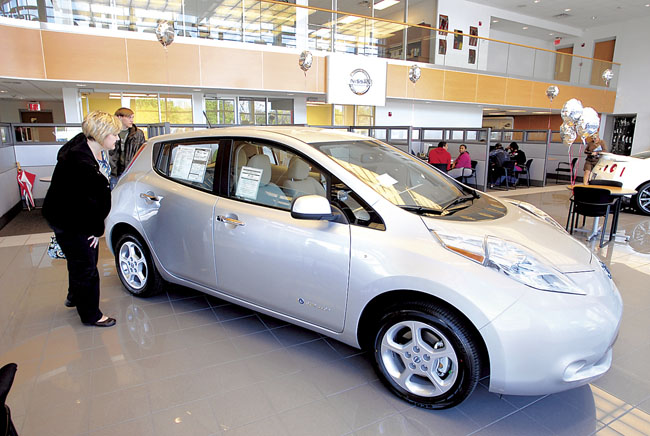 Customers Renee Wright, left, and Josh Ridings look at a Nissan Leaf, a zero-emission electric car, in the showroom of Mountain View Nissan. The dealership has taken delivery of two of the vehicles, and has a waiting list of customers to buy them when more come in.
Staff Photo by John Rawlston/Chattanooga Times Free Press
Customers Renee Wright, left, and Josh Ridings look at a Nissan Leaf, a zero-emission electric car, in the showroom of Mountain View Nissan. The dealership has taken delivery of two of the vehicles, and has a waiting list of customers to buy them when more come in.
Staff Photo by John Rawlston/Chattanooga Times Free PressWhen you pass a gas station these days, surely you notice that the price for a gallon of gas is not too far below $4.
That cost becomes even more painfully evident when you stop to fill your tank.
We have been running our cars on gasoline for as long as we have had them. We surely will continue to depend upon gasoline for decades to come.
Though we have lots of oil in the United States, we also depend heavily upon a lot of foreign oil to meet our fuel needs. And we remember that, from time to time, we have had gasoline shortages and supply disruptions.
So some have wondered why we remain so dependent upon oil, domestic and foreign. Well, "We've always done it that way," some may say.
But are there interesting, and practical, alternatives? If we didn't depend upon gasoline for our cars, what would we use?
How about electric-powered cars?
The technology long has been available. Chevrolet currently produces an electricity-propelled car called, appropriately, the Volt.
Batteries in electric cars can be plugged in for recharging at home overnight, when electricity demand is low. Small auxiliary gasoline engines can also be built into the cars to supplement electric power and to avoid running out of power between recharges.
Tennessee's Sen. Lamar Alexander recently observed, "We've got enough fuel sitting on the sidelines in terms of unused electricity capacity at night to power 40 percent of our cars and trucks at a lower cost without using oil."
Just imagine: If many of our cars were powered by electricity, we could plug them in to sockets at night, when electricity demand is small. Then we could run our cars after we wake up, without using so much oil.
But what's the future of electric cars? Supply, demand - and prices - will surely provide the answer.
We will not likely be adopting electricity-propelled cars in huge numbers immediately, in part because of how costly they can be even with improper government subsidies. But we may do so gradually.
Market forces should be allowed to drive such decisions by consumers.
If those market forces are allowed to play out naturally, then somewhere along the way, the "electric option" may become economically viable and attractive.